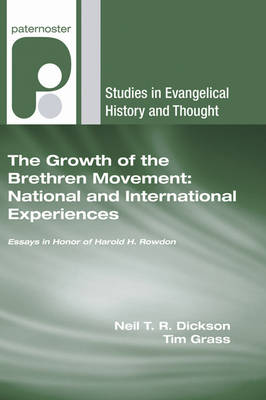
- Afhalen na 1 uur in een winkel met voorraad
- Gratis thuislevering in België vanaf € 30
- Ruim aanbod met 7 miljoen producten
- Afhalen na 1 uur in een winkel met voorraad
- Gratis thuislevering in België vanaf € 30
- Ruim aanbod met 7 miljoen producten
Zoeken
The Growth of the Brethren Movement: National and International Experiences
Essays in Honor of Harold H. Rowdon
€ 86,95
+ 173 punten
Omschrijving
The essays in this book have been contributed in honour of Dr. H.H. Rowdon, a teacher of several generations of students at the London Bible College and a historian of the Brethren movement. The book includes reflections on the historiography of the Brethren, but it is their character and growth which form the principal focus. The writers make original contributions to national, regional, or local histories and at the same time raise wider themes and issues on topics such as revivalism in New Zealand and the Orkney Islands, or paternalism and missionary endeavor in Zambia. Leading features of the Brethren are discussed through papers on several seminal figures such as Anthony Norris Groves, John Eliot Howard, and George Muller. Above all, the opportunities and problems represented by the worldwide growth of the movement are looked at with reference to a number of countries, among them Britain, Germany, Jamaica, and Angola, or to individual congregations in places as diverse as Birmingham, Singapore, and Tasmania. 'Over the whole world...', concludes Prof. D.W. Bebbington in his contribution, 'Brethren played a distinctive role as evangelicals of the evangelicals.'
Specificaties
Betrokkenen
- Uitgeverij:
Inhoud
- Aantal bladzijden:
- 296
- Taal:
- Engels
- Reeks:
Eigenschappen
- Productcode (EAN):
- 9781498248822
- Verschijningsdatum:
- 1/12/2006
- Uitvoering:
- Hardcover
- Formaat:
- Genaaid
- Afmetingen:
- 159 mm x 229 mm

Alleen bij Standaard Boekhandel
+ 173 punten op je klantenkaart van Standaard Boekhandel
Beoordelingen
We publiceren alleen reviews die voldoen aan de voorwaarden voor reviews. Bekijk onze voorwaarden voor reviews.







